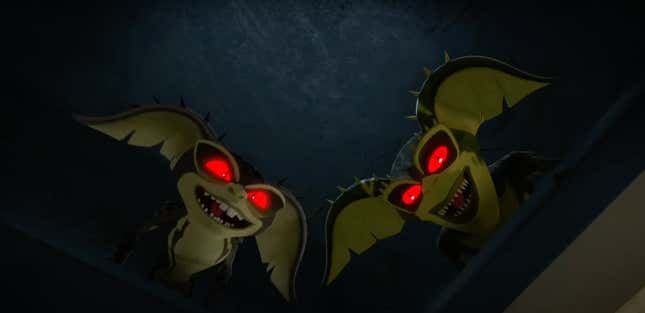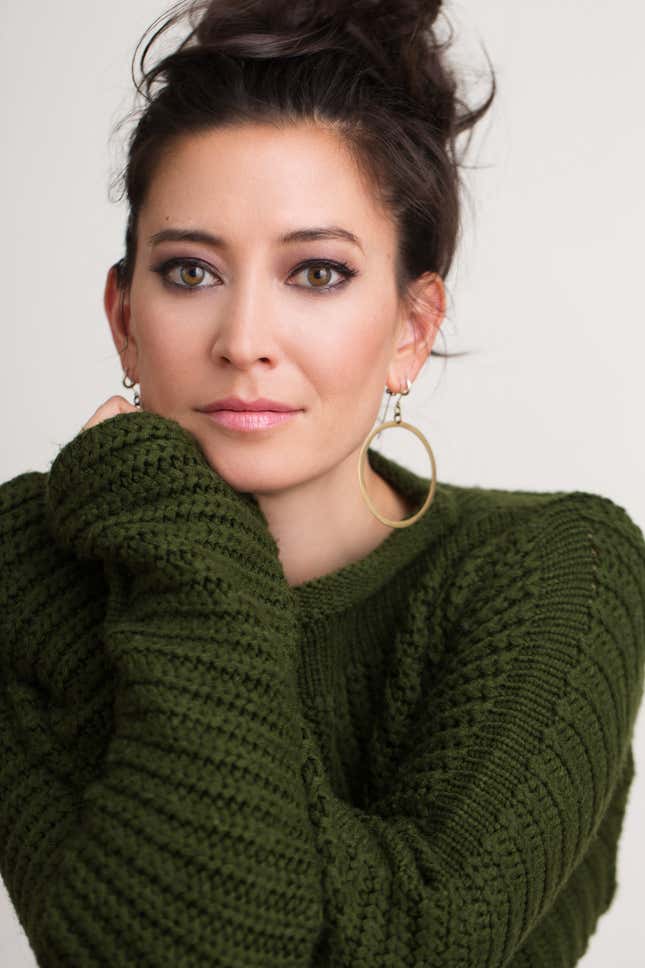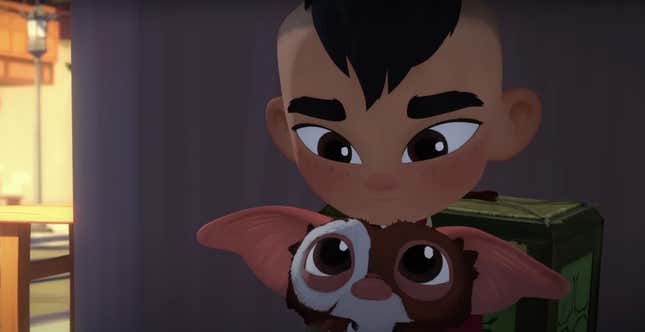Get in on Gizmo’s early adventures with the young Sam Wing in Gremlins: Secrets of the Mogwai. The Max and Amblin animated series from creators Tze Chun and Brendan Hay is inspired by Joe Dante’s Gremlins films, and features the work of composer Sherri Chung, whose score elevates the show’s aspects of whimsy, action, and danger with the Wing family at its heart.
Watch an exclusive clip of Gremlins: Secrets of the Mogwai and check out io9’s interview with Chung below.
Sabina Graves, io9: Little backstory here. I almost bought a Gremlins vinyl at Coachella last year and regret not doing it and carrying it around with me all night. I was excited to hear a big orchestral version of the theme included in the show’s intro. Tell me more about how you became a part of the project, and how you approached expanding on the musical landscape for Gizmo’s origin adventure. It sounds so epic!
Sherri Chung: Thank you so much. And we’re working on a vinyl right now, currently just working on the soundtrack [and] the digital release. So Gremlins as a kid—it was way too scary for me. I knew about the movies but it was just cute little Gizmo. I didn’t really watch it until later, you know? After a while I was like, “Okay, yeah, this is pretty scary.” But when this project came about, first I was thinking, “Gosh, you know, animation. I’m not really sure. I don’t really do kid’s things.” Then I saw what they were doing with it, where they were going with this, and I thought, “I have to do this and then try my hardest. I really want to get this.” Luckily I did, and it’s been a dream come true because as I’ve gotten into the project, I have discovered more and more about the movies that I wasn’t aware of, about Jerry Goldsmith’s original score, and it just became this really fun, fulfilling journey.
io9: That’s amazing. I love the sort of atmosphere it creates for these adventures. And you’re right, it’s not just a “kid’s show,” it’s a show for everyone and has that Amblin feel. Were those films a part of your path as a composer? What were the movie scores that inspired you?
Chung: I think that’s where most of my inspiration came from in terms of the earlier, more formative years. When I watched those movies, all the Amblin movies, Indiana Jones and all of those, I don’t think I knew what I was listening to. I gathered more on the experience of what I felt, and I think that’s what a lot of audience members do—that’s what we composers hope that audience members will do. It’s like, don’t listen to the music as much as you experience letting the music help you experience the film at large. And I think that was my takeaway from those movies growing up as I got a little bit older.
Jerry Goldsmith even has his score to The ‘Burbs with Joe Dante—they teamed up again, and there’s all these crazy nods that Jerry will do in the film scores that he has done. I feel inspired by the permission to just do something that’s a little bit overt. In the opening of The ‘Burbs he uses a dog bark in part of the score. And if anyone watches that opening montage, you hear the dog barking, and then all of a sudden you hear it kind of looped “bark-bark-bark,” and you actually hear it in the score. That is so cheeky, that’s not always something we can get away with. Not every project is going to call for something like that. But I think this show did and so that was a lot of my [takeaway], just sort of these little snippets that you’re like, “That’s really fun and interesting. I’m going to see if I can get away with some of them.”
io9: Tze Chun is such a collaborative showrunner and producer. What was it like being in the room discussing what you all wanted to bring to these stories that was different and would set this apart from the movies?
Chung: Tze, he’s on a different level. The things that he’s creating are just really exciting and really fun. He’s not afraid and just leans into that. We all know what the audience wants to see and experience. That was that was something that he and Brendan [Hay] really wanted to lead with the emotion. They were not interested in dumbing anything down. They didn’t want the scares to be less scary. They really wanted to push all the different angles of it, and especially the emotion. The emotion didn’t just mean the really heartfelt moments between Sam and Gizmo or the heartfelt moments between Sam and his family, but also the things that pushed into the ideas of fear and guilt. Sam is really confronted with a lot of those human emotions that, yes, he’s a kid but he’s not really playing as a kid. He’s playing like an adult—that’s kind of the Amblin way, where you have these young kids in these more mature situations. That’s what I think sucks us all in there. And so that was something that we talked about, really leaning into the journey of Sam and Gizmo and all of the peril that they see that comes to them.

As I progressed through it, there was absolutely “we want Jerry Goldsmith’s The Gremlin Rag’,” they wanted that as the opening credits, the end credits. So I did an arrangement of that which was just really, really fun. And then of course, there’s Gizmo’s lullaby. So there was some opportunity for the score to sort of accompany them and back that up. These were definitely two of Jerry’s themes that fans would want to hear, that Tze wanted to hear, that I wanted to do. But the rest of it, Tze and Brendan both said, “We want it to be our thing. Paying homage, yes, but we still want it to lean into something that’s new and something that fans can identify”—but also grab the newer fans as well. I really wanted to take this and really take ownership as a composer, not for the ego part of it, but for what the score for the show really demanded, a unique approach and an additional point of view. It’s a different story, it’s the prequel.
io9: Absolutely. It takes place in Shanghai in the 1920s, which kind of harkens back to adventure movies like Indiana Jones, by being this faraway place rather than New York in the 1980s.
Chung: They did a real origin story. It’s a great approach. I think it was a really effective one, too.

io9: I’m curious, is genre the space that you prefer to work in as far as composing for TV and film?
Chung: Honestly, I feel like my wheelhouse kind of becomes whatever the project is. But when I started Gremlins, I was like, “Oh, this is not my wheelhouse,” or “This is what I want my wheelhouse to be, bigger orchestral music,” you know—adventure, that kind of thing was always a world that I wanted to play in. But I think, if there’s any film composers [reading], they’ll understand that when we first start out in our careers, we don’t get a chance to do these big orchestral scores. It’s just not the projects that we’re generally hired for; it’s certainly not the budgets that we’re generally getting to work within. I think it’s always a dream for a lot of us to have these [opportunities like] John Williams and Jerry Goldsmith and Alan Silvestri and so many more that do these orchestral environments as well. We always want to be following in their footsteps and carrying on the tradition, but that’s not normally what we get hired for.
So I think that it’s a muscle that, at least for me, I was not able to flex or or even just practice. I wasn’t even even able to exercise that part of my creative and composing muscle. When I started this project, I thought, “Gosh, how did I land this thing? They’re all going to see through me. They’re all going to know that I that I wasn’t the right pick for this.” But even my own narrative has changed since then … I feel the ownership of it. I feel like, “Yes, I’ve done well.” And so to answer your question, I feel that yes, this is absolutely what I want my wheelhouse to be. And I think it’s a part of my wheelhouse. I’m still learning so many different kinds of music. But this one is especially incredibly fulfilling.
io9: Thank you for such an incredible conversation, it’s really cool to see the representation across the board with every creative on Gremlins. I’m so excited for people to see the show.
Chung: Me too. And I really hope it resonates with them. I hope they’re showing their kids this and they’re kind of going back in their own nostalgia for it, too. So it’s exciting.

Gremlins: Secrets of the Mogwai is streaming on Max.
Want more io9 news? Check out when to expect the latest Marvel, Star Wars, and Star Trek releases, what’s next for the DC Universe on film and TV, and everything you need to know about the future of Doctor Who.






